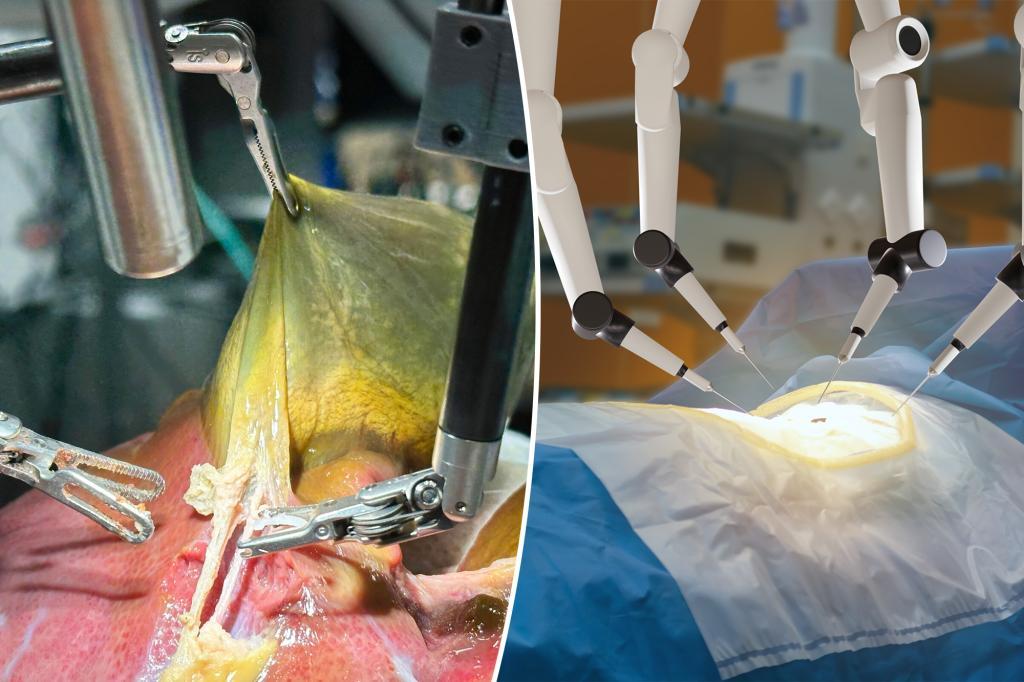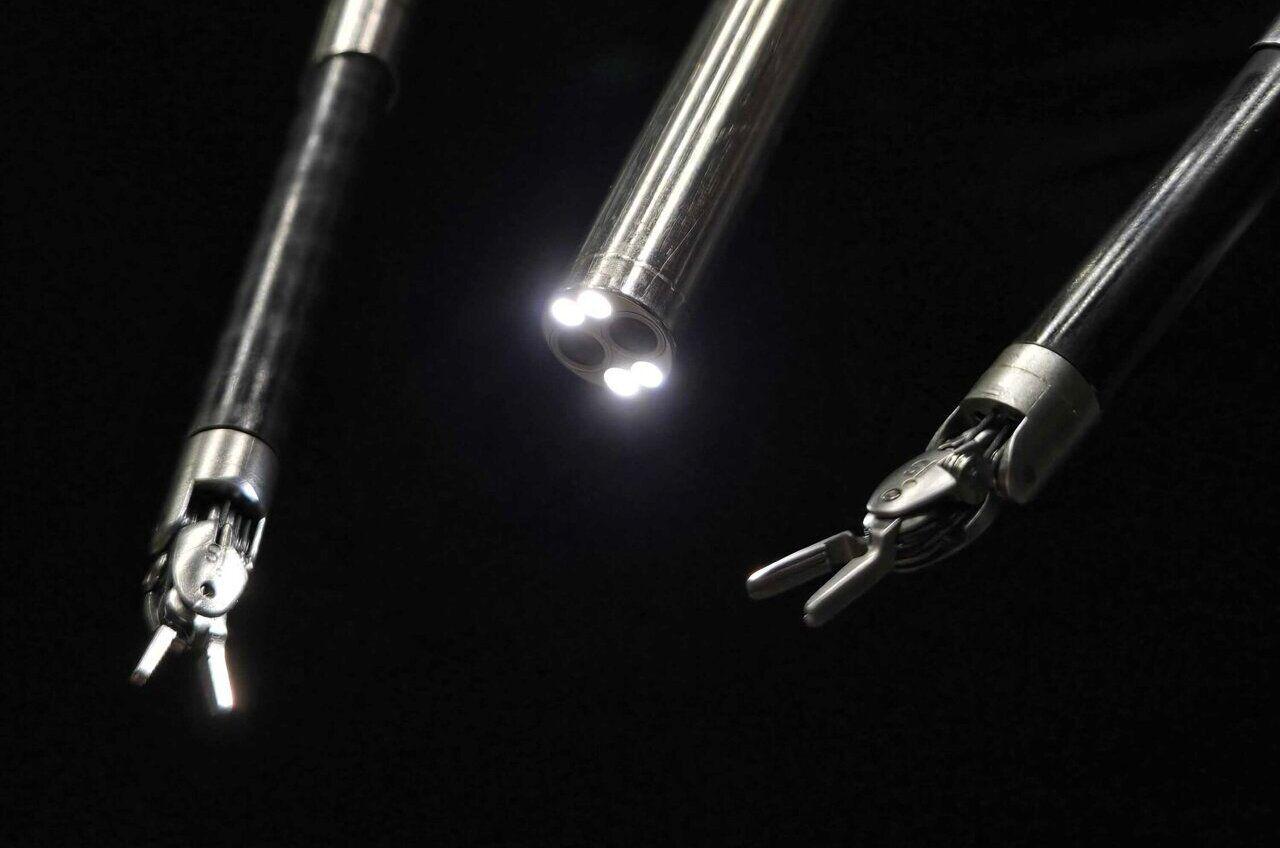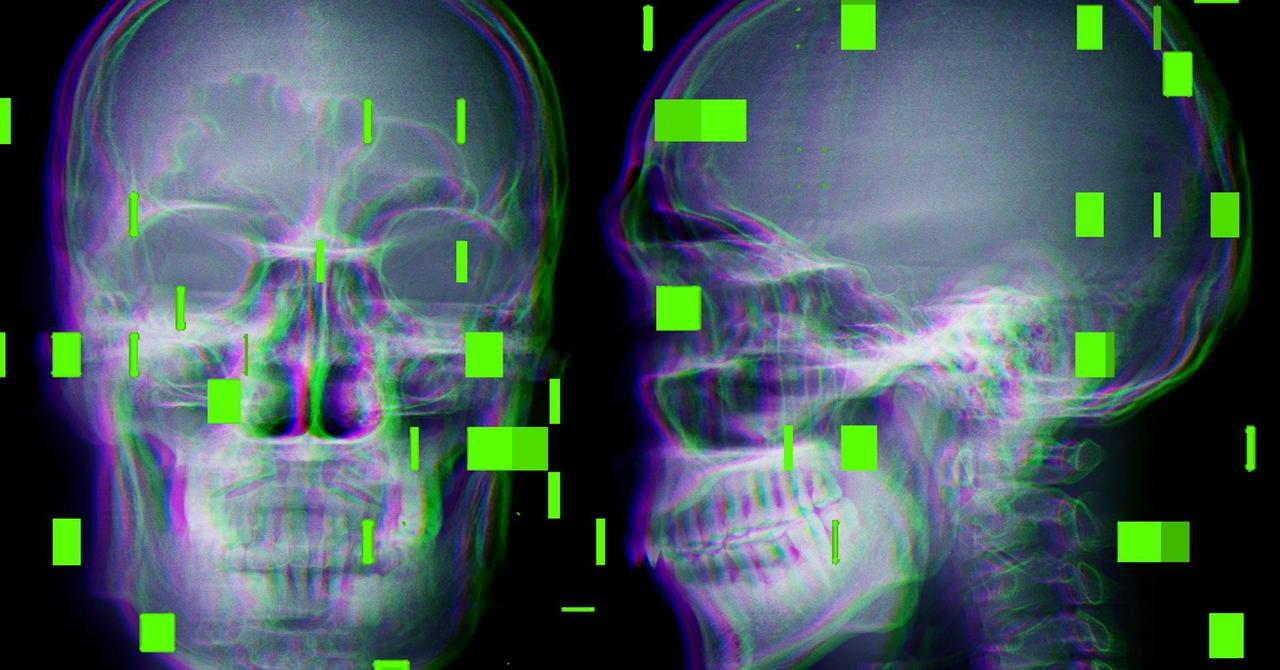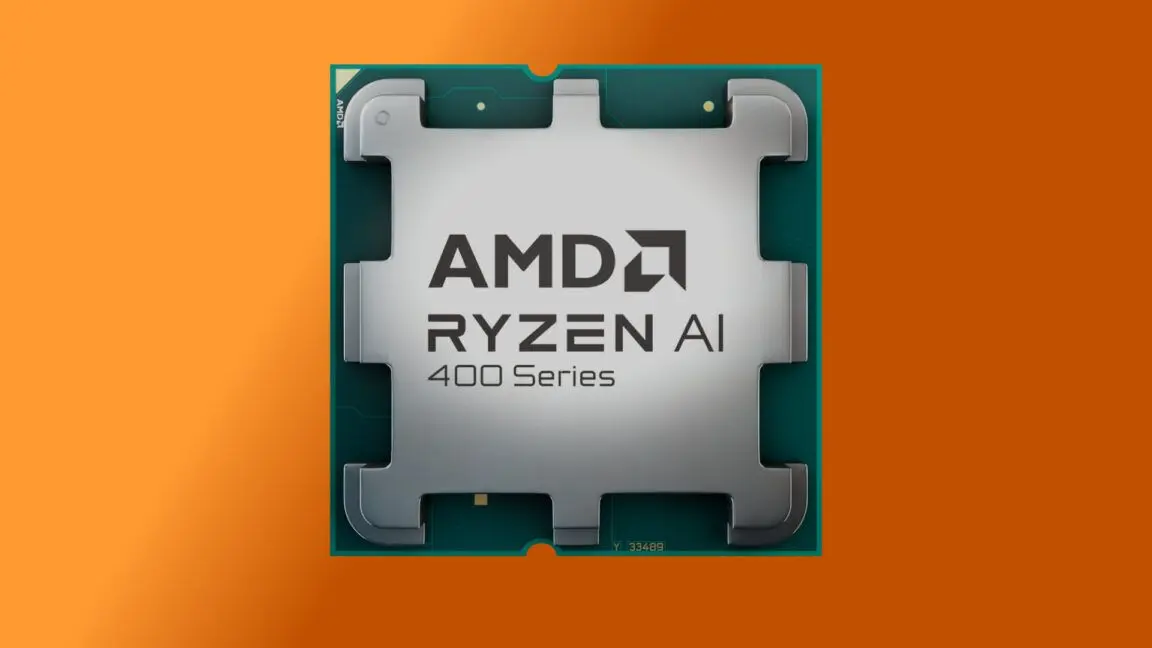AI-Powered Robot Performs Autonomous Gallbladder Surgery, Marking Milestone in Surgical Robotics
6 Sources
6 Sources
[1]
Surgical robots take step towards fully autonomous operations
An AI system trained on videos of operations successfully guided a robot to carry out gall bladder surgery on a dead pig, with minimal human assistance An AI-powered robot was able to remove a gall bladder from a dead pig in what researchers claim is the first realistic surgery by a machine with almost no human intervention. The robot is powered by a two-tier AI system trained on 17 hours of video encompassing 16,000 motions made in operations by human surgeons. When put to work, the first layer of the AI system watches video from an endoscope monitoring the surgery and issues plain-language instructions, such as "clip the second duct", while the second AI layer turns each instruction into three-dimensional tool motions. In all, the gall bladder surgery required 17 separate tasks. The robotic system performed the operation eight times, achieving 100 per cent success in all of the tasks. "Current surgical robotic technology has made some procedures less invasive, but complication rates haven't really dropped from previous laparoscopic [keyhole] surgeries [by human surgeons]," says team member Axel Krieger at Johns Hopkins University in Maryland. "This made us look into what is the next generation of robotic systems that can help patients and surgeons." "The study really highlights the art of the possible with AI and surgical robotics," says Danail Stoyanov at University College London. "Incredible advances in computer vision for surgical video with the availability of open robotic platforms for research make it possible to demonstrate surgical automation." But many challenges remain to make the system practical in clinical use, points out Stoyanov. For one thing, while the robot completed the task with 100 per cent success, it had to self-correct six times per case. For example, this could mean a gripper designed to grasp an artery missed its hold on the first try. "There were a lot of instances where it had to self-correct, but this was all fully autonomous," says Krieger. "It would correctly identify the initial mistake and then fix itself." The robot also had to ask a human to change one of its surgical instruments for another, meaning some level of human intervention was required. Ferdinando Rodriguez y Baena at Imperial College London is enthused about the growing potential of robotic surgery. "The future is bright - and tantalisingly close," he says. "Though to realise this safely in humans, regulation will need to follow suit, which remains a significant open challenge in our sector." The next step, says Krieger, is to let a robot operate autonomously on a live animal, where breathing and bleeding could complicate things.
[2]
Experimental surgical robot performs gallbladder procedure autonomously
July 9 (Reuters) - An experimental AI-guided robot can autonomously perform a delicate, complicated phase of a common gallbladder operation, marking a major step toward automated medical procedures, researchers said on Wednesday. Existing surgical robots are remotely controlled by surgeons. The new system uses artificial intelligence to make independent decisions and adapts to unexpected complications during operations, said Axel Krieger of Johns Hopkins University in Baltimore, who led the research. He likened it to an autonomous vehicle that can "navigate any road, in any condition, responding intelligently to whatever it encounters." "This advancement moves us from robots that can execute specific surgical tasks to ones that truly understand surgical procedures," he said. The SRT-H robot was trained via an AI framework known as language-guided imitation learning, using videos of surgeons performing gallbladder removal surgeries on pig cadavers, the researchers reported in Science Robotics. The robot was tested on eight varying sets of pig gallbladders and livers that had been removed from the animals. Separating the gallbladder from the liver takes several minutes and involves "diverse tool use, including grabbing, clipping, and cutting - skills common in real surgical procedures," along with decision-making and adaptation, the researchers said. The pig organs and blood vessels in the tests varied widely in appearance and anatomy, "mirroring the diversity encountered in human surgeries," they said. While the robot achieved 100% accuracy in the surgeries, it took longer to perform the work than a human surgeon. Commercially available surgical robots include Intuitive Surgical's (ISRG.O), opens new tab da Vinci Surgical System, which has been used in over 12 million procedures globally since receiving FDA approval in 2000. Unlike SRT-H, the da Vinci system relies entirely on human surgeons to control its movements remotely. The global surgical robotics market is approaching $10 billion annually with about 2.7 million robotic procedures performed in 2024, Baird analyst David Rescott estimated. Eventually, autonomous surgical robots could help address surgeon shortages, minimize human error, and provide consistent, high-quality care in underserved regions, the researchers said. The research was supported by the Advanced Research Projects Agency for Health, the National Science Foundation, and the National Institutes of Health. Reporting by Kamal Choudhury in Bengaluru; editing by Nancy Lapid and Bill Berkrot Our Standards: The Thomson Reuters Trust Principles., opens new tab Suggested Topics:Healthcare & Pharmaceuticals
[3]
Robot surgery on humans could be trialled within decade after success on pig organs
AI-trained robot carries out procedures on dead pig organs to remove gall bladders without any human help Automated surgery could be trialled on humans within a decade, say researchers, after an AI-trained robot armed with tools to cut, clip and grab soft tissue successfully removed gall bladders without human help. The robot surgeons were schooled on video footage of human medics conducting operations using organs taken from dead pigs. In an apparent research breakthrough, eight operations were conducted on pig organs with a 100% success rate by a team led by experts at Johns Hopkins University in Baltimore in the US. The Royal College of Surgeons in the UK called it "an exciting development that shows great promise", while John McGrath, a leading expert on robotic surgery in the UK, called the results "impressive" and "novel" and said it "takes us further into the world of autonomy". It opens up the possibility of replicating, en masse, the skills of the best surgeons in the world. The technology allowing robots to handle complex soft tissues such as gallbladders, which release bile to aid digestion, is rooted in the same type of computerised neural networks that underpin widely used artificial intelligence tools such as Chat GPT or Google Gemini. The surgical robots were slightly slower than human doctors but they were less jerky and plotted shorter trajectories between tasks. The robots were also able to repeatedly correct mistakes as they went along, asked for different tools and adapted to anatomical variation, according to a peer-reviewed paper published in the journal Science Robotics. The authors from Johns Hopkins, Stanford and Columbia universities called it "a milestone toward clinical deployment of autonomous surgical systems". Almost all the 70,000 robotic procedures carried out annually in the NHS in England were fully controlled under human instruction, with only bone-cutting for hip and knee operations semi-autonomous, McGrath said. Last month the health secretary, Wes Streeting, said increasing robotic surgery was at the heart of a 10-year plan to reform the NHS and cut waiting lists. Within a decade, the NHS has said, nine in 10 of all keyhole surgeries will be carried out with robot assistance, up from one in five today. In the Johns Hopkins trial, the robots took just over five minutes to carry out the operation, which required 17 steps including cutting the gallbladder away from its connection to the liver, applying six clips in a specific order and removing the organ. The robots on average corrected course without any human help six times in each operation. "We were able to perform a surgical procedure with a really high level of autonomy," said Axel Krieger, assistant professor of mechanical engineering at Johns Hopkins. "In prior work, we were able to do some surgical tasks like suturing. What we've done here is really a full procedure. We have done this on eight gallbladders, where the robot was able to perform precisely the clipping and cutting step of gallbladder removal without any human intervention. "So I think it's a really big landmark study that such a difficult soft tissue surgery is possible to do autonomously." McGrath, who chairs NHS England's robotics steering committee, said autonomous surgery, while still years away, could one day lead to a human surgeon overseeing several autonomous robotic operations at the same time, carrying out simple procedures such as hernia operations or gall bladder removals more rapidly, with greater precision than humans and with less damage to surrounding bodily structures. But he cautioned that autonomous surgery remained a long way from being clinically deployable, because tests on dead pig organs do not test the robots' capacity to react to a patient moving and breathing, blood running in the field of operation, an inadvertent injury, smoke from cauterisation or fluid on the camera lens. Nuha Yassin, who leads on robotic surgery at the Royal College of Surgeons of England, said: "The next step must involve a careful exploration of the nuances within this rapidly evolving field to assess how these findings can be safely and effectively translated into a human pilot. Only then can this approach move toward, becoming a sustainable model for the future." She said training, education and patient safety must remain at the forefront.
[4]
AI Controlled Robot Performs Gallbladder Removal With "100 Percent Accuracy"
An AI-controlled robot has autonomously completed a gallbladder removal with "100 percent accuracy." The procedure, conducted by a team of Johns Hopkins University researchers, demonstrated the power of AI, which allowed the robot to make independent decisions and adapt to unexpected complications on the fly. (You might be relieved to learn, though, that the surgery was conducted on a hyper-detailed manequin with realistically-textured internal organs, not a living human patient.) The accomplishment is still pretty impressive. The surgical robot acted like a self-driving car that can "navigate any road, in any condition, responding intelligently to whatever it encounters," as Johns Hopkins research lead Axel Krieger said in a statement about the feat. The procedure could set an important precedent as robotic surgeons become more commonplace in the operating room. While remotely controlled surgery robots have been around for decades, scientists are only starting to develop AI-guided ones that can make their own decisions independently of a human operator. "This work represents a major leap from prior efforts because it tackles some of the fundamental barriers to deploying autonomous surgical robots in the real world," said lead author and Johns Hopkins postdoctoral researcher Ji Woong Kim in the statement. "Our work shows that AI models can be made reliable enough for surgical autonomy -- something that once felt far-off but is now demonstrably viable," he added. The robot, dubbed SRT-H, was trained on videos of surgeons performing similar gallbladder removal surgeries on dead pigs, as detailed in a new paper published in the journal Science Robotics this week. The robot carefully removed the gallbladder, a tiny organ that concentrates bile and digestive fluids, from the liver by "grabbing, clipping, and cutting." "Our method achieves a 100 percent success rate across eight different ex vivo gallbladders, operating fully autonomously without human intervention," the paper reads. "This work demonstrates step-level autonomy in a surgical procedure, marking a milestone toward clinical deployment of autonomous surgical systems." The robot's still considerably slower than a human surgeon, leaving room for improvement. But the researchers see their latest success as a major stepping stone. "To me it really shows that it's possible to perform complex surgical procedures autonomously," Krieger said in the press release. "This is a proof of concept that it's possible and this imitation learning framework can automate such complex procedure with such a high degree of robustness." Krieger and his colleagues are now looking for ways to teach the robot different types of procedures beyond gallbladder removals, and achieve the first fully autonomous surgery that requires no intervention.
[5]
Autonomous gallbladder removal: Robot performs first realistic surgery without human help
A robot trained on videos of surgeries performed a lengthy phase of a gallbladder removal without human help. The robot operated for the first time on a lifelike patient, and during the operation, responded to and learned from voice commands from the team -- like a novice surgeon working with a mentor. The robot performed unflappably across trials and with the expertise of a skilled human surgeon, even during unexpected scenarios typical in real-life medical emergencies. The work, led by Johns Hopkins University researchers, is a transformative advancement in surgical robotics, where robots can perform with both mechanical precision and human-like adaptability and understanding. "This advancement moves us from robots that can execute specific surgical tasks to robots that truly understand surgical procedures," said medical roboticist Axel Krieger. "This is a critical distinction that brings us significantly closer to clinically viable autonomous surgical systems that can work in the messy, unpredictable reality of actual patient care." The findings are published in Science Robotics. In 2022, Krieger's Smart Tissue Autonomous Robot, STAR, performed the first autonomous robotic surgery on a live animal -- a laparoscopic surgery on a pig. But that robot required specially marked tissue, operated in a highly controlled environment, and followed a rigid, predetermined surgical plan. Krieger said it was like teaching a robot to drive along a carefully mapped route. But his new system, he says, "is like teaching a robot to navigate any road, in any condition, responding intelligently to whatever it encounters." Surgical Robot Transformer-Hierarchy, SRT-H, truly performs surgery, adapting to individual anatomical features in real time, making decisions on the fly, and self-correcting when things don't go as expected. Built with the same machine learning architecture that powers ChatGPT, SRT-H is also interactive, able to respond to spoken commands ("grab the gallbladder head") and corrections ("move the left arm a bit to the left"). The robot learns from this feedback. "This work represents a major leap from prior efforts because it tackles some of the fundamental barriers to deploying autonomous surgical robots in the real world," said lead author Ji Woong "Brian" Kim, a former postdoctoral researcher at Johns Hopkins who's now with Stanford University. "Our work shows that AI models can be made reliable enough for surgical autonomy -- something that once felt far-off but is now demonstrably viable." Last year, Krieger's team used the system to train a robot to perform three foundational surgical tasks: manipulating a needle, lifting body tissue, and suturing. Those tasks took just a few seconds each. The gallbladder removal procedure is much more complex, a minutes-long string of 17 tasks. The robot had to identify certain ducts and arteries and grab them precisely, strategically place clips, and sever parts with scissors. SRT-H learned how to do the gall bladder work by watching videos of Johns Hopkins surgeons doing it on pig cadavers. The team reinforced the visual training with captions describing the tasks. After watching the videos, the robot performed the surgery with 100% accuracy. Although the robot took longer to perform the work than a human surgeon, the results were comparable to an expert surgeon. "Just as surgical residents often master different parts of an operation at different rates, this work illustrates the promise of developing autonomous robotic systems in a similarly modular and progressive manner," says Johns Hopkins surgeon Jeff Jopling, a co-author. The robot performed flawlessly across anatomical conditions that weren't uniform, and during unexpected detours -- such as when the researchers changed the robot's starting position and when they added blood-like dyes that changed the appearance of the gallbladder and surrounding tissues. "To me it really shows that it's possible to perform complex surgical procedures autonomously," Krieger said. "This is a proof of concept that it's possible and this imitation learning framework can automate such complex procedures with such a high degree of robustness." Next, the team would like to train and test the system on more types of surgeries and expand its capabilities to perform a complete autonomous surgery.
[6]
AI- trained robot completes groundbreaking gall bladder operation...
An AI-powered robot has completed a groundbreaking surgical procedure, potentially changing the future of medicine forever. The bot successfully separated the gall bladder from the liver of a dead pig, with experts now exclaiming that automated surgery could be trialled on humans within a decade. "The future is bright - and tantalisingly close," Ferdinando Rodriguez y Baena, a Medical Robotics professor at Imperial College London, told New Scientist. Until now, surgical interventions involving AI have largely focused on simple task automation. This gall bladder operation was far more complex, with the robot surgeon -- powered by a two-tier AI system -- trained on 17 hours of video encompassing 16,000 motions. The first AI layer watched the video footage and subsequently created plain-language instructions. The second AI layer then turned each instruction into three-dimensional tool motions so that the bot could complete the operation. The robotic system achieved 100 per cent success in all of the tasks. To make sure it wasn't just a fluke, the bot performed the same operation seven more times. Each time, the 100 per cent success rate remained A team of researchers from Johns Hopkins University in Baltimore led the AI experiment. "This made us look into what is the next generation of robotic systems that can help patients and surgeons," Axel Krieger from Johns Hopkins told The New Scientist. However, human surgeons shouldn't worry about becoming obsolete just yet. During the surgery, the AI bot had to self-correct multiple times. "There were a lot of instances where it had to self-correct, but this was all fully autonomous," Krieger explained. "It would correctly identify the initial mistake and then fix itself." Further, the robot also had to ask a human to switch out one of its surgical instruments for another, meaning the operation was not entirely automated. While The Guardian cites experts as saying that robot surgery on humans could be trialled within a decade, Krieger says the next step would be to let the robot operate autonomously on a live animal, "where breathing and bleeding could complicate things."
Share
Share
Copy Link
Researchers at Johns Hopkins University have developed an AI-guided robot capable of performing gallbladder removal surgery autonomously, achieving 100% success rate in trials on pig organs. This breakthrough represents a significant step towards fully autonomous surgical procedures.
AI-Powered Surgical Robot Achieves Autonomous Gallbladder Removal
In a groundbreaking development, researchers at Johns Hopkins University have successfully created an AI-guided robot capable of performing gallbladder removal surgery autonomously. The robot, named SRT-H (Surgical Robot Transformer-Hierarchy), achieved a 100% success rate in trials conducted on pig organs, marking a significant milestone in the field of surgical robotics
1
2
3
.
Source: New York Post
Advanced AI Training and Capabilities
The SRT-H robot was trained using a sophisticated AI framework known as language-guided imitation learning. This training involved analyzing 17 hours of video footage, encompassing 16,000 motions made by human surgeons during operations
1
. The robot's AI system operates on two levels:- The first layer observes the surgery through an endoscope and issues plain-language instructions.
- The second layer translates these instructions into precise three-dimensional tool movements
1
.
This advanced AI allows the robot to make independent decisions and adapt to unexpected complications during surgeries, similar to how an autonomous vehicle navigates various road conditions
2
.Successful Trials and Performance
The robot successfully performed the gallbladder removal procedure, which involves 17 separate tasks, eight times with 100% accuracy
1
2
. These tasks included complex actions such as grabbing, clipping, and cutting - skills common in real surgical procedures2
. The robot demonstrated its ability to self-correct, averaging six corrections per operation without human intervention1
3
.While the robot's performance was highly accurate, it did take longer to complete the procedure compared to human surgeons. However, researchers noted that the robot's movements were less jerky and followed shorter trajectories between tasks
3
.
Source: Tech Xplore
Implications for Future of Surgery
This advancement represents a significant step towards clinically viable autonomous surgical systems. Dr. Axel Krieger, the lead researcher, emphasized that this development moves surgical robotics from executing specific tasks to truly understanding surgical procedures
2
4
.The potential applications of such technology are vast:
- Addressing surgeon shortages in underserved regions
- Minimizing human error in surgical procedures
- Providing consistent, high-quality care across different healthcare settings
2
Related Stories
Challenges and Future Directions
Despite the impressive results, several challenges remain before this technology can be implemented in clinical settings:
- Testing on live subjects to account for factors like breathing, bleeding, and unexpected movements
3
- Regulatory approvals and safety considerations
1
- Further reducing the time taken for procedures
4
The research team is now focusing on training the robot for different types of surgeries and working towards achieving the first fully autonomous surgery that requires no human intervention
4
5
.Industry Impact and Market Potential

Source: New Scientist
The global surgical robotics market is rapidly expanding, approaching $10 billion annually with about 2.7 million robotic procedures performed in 2024
2
. This new technology could potentially revolutionize the field, building upon existing systems like Intuitive Surgical's da Vinci Surgical System, which has been used in over 12 million procedures globally since 20002
.As the technology progresses, it opens up the possibility of replicating the skills of the world's best surgeons on a massive scale, potentially transforming surgical care worldwide
3
. While human trials are still years away, researchers estimate that autonomous surgery could be tested on humans within the next decade3
5
.References
Summarized by
Navi
[1]
Related Stories
AI-Powered Surgical Robot Learns to Perform Complex Procedures by Watching Videos
12 Nov 2024•Science and Research

Surgical Robots Learn from Videos: A Leap Forward in Medical AI
31 Dec 2024•Science and Research

AI in surgery faces scrutiny as TruDi Navigation System linked to strokes and patient injuries
09 Feb 2026•Health

Recent Highlights
1
OpenAI secures $110 billion funding round from Amazon, Nvidia, and SoftBank at $730B valuation
Business and Economy

2
Pentagon accepts OpenAI's autonomous weapons restrictions after blacklisting Anthropic
Policy and Regulation

3
Trump orders federal agencies to ban Anthropic after Pentagon dispute over AI surveillance
Policy and Regulation





